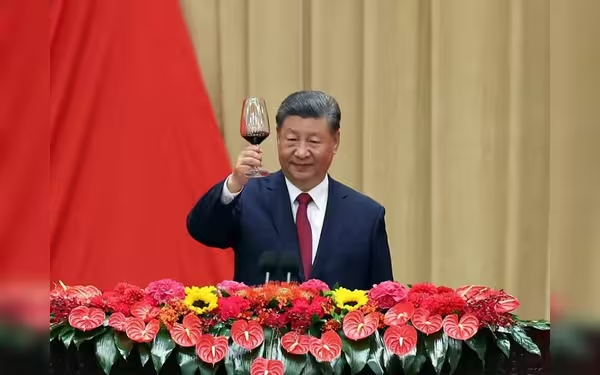Sunday, October 6, 2024 12:25 AM
Xi Jinping Reiterates Call for Taiwan Reunification
- Xi emphasizes national reunification as a common aspiration.
- Tensions rise as Taiwan maintains independence stance.
- International relations complicate the Taiwan Strait dynamics.
 Image Credits: tribune.com.pk
Image Credits: tribune.com.pkXi Jinping reiterates the call for Taiwan reunification amid rising tensions and international scrutiny.
In recent years, the relationship between China and Taiwan has been a focal point of international discussions. Taiwan, a self-governing island, is claimed by China as part of its territory. This long-standing dispute has roots that go back to the Chinese Civil War, which ended in 1949. Since then, Taiwan has operated independently, but China has consistently expressed its desire for reunification.
During a significant address on the eve of national holiday celebrations, President Xi Jinping emphasized this desire once again. He stated, "Achieving complete national reunification is the common aspiration of the Chinese people." This statement reflects the strong sentiment among many in China who view Taiwan as an integral part of the nation.
Xi's remarks come at a time when tensions between China and Taiwan have escalated. The Taiwanese government, led by President Tsai Ing-wen, has maintained a stance of independence, which has led to increased military activity in the region. The situation is further complicated by international relations, as countries around the world watch closely, balancing their own interests with the delicate dynamics of the Taiwan Strait.
It is important to understand that the call for reunification is not just a political statement; it resonates deeply with many Chinese citizens who feel a strong connection to Taiwan. However, the people of Taiwan have their own identity and aspirations, which often clash with the views held by the Chinese government.
As the world continues to evolve, the question of Taiwan's status remains a critical issue. The desire for peace and stability in the region is paramount, and it is essential for all parties involved to engage in constructive dialogue. The future of Taiwan and its relationship with China will undoubtedly shape the geopolitical landscape in the years to come. Understanding these complexities is crucial for anyone interested in international relations and the dynamics of East Asia.













